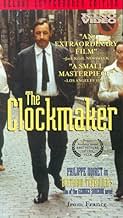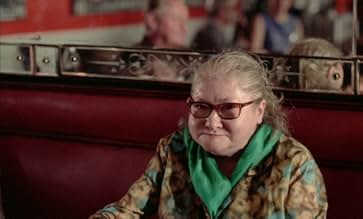L'horloger de Saint-Paul
- 1974
- Tous publics
- 1h 45m
IMDb RATING
7.1/10
3K
YOUR RATING
A watchmaker finds out one day that his son has become a murderer. He tries to understand for whom and why.A watchmaker finds out one day that his son has become a murderer. He tries to understand for whom and why.A watchmaker finds out one day that his son has become a murderer. He tries to understand for whom and why.
- Awards
- 4 wins & 1 nomination total
Featured reviews
In spite of watching that movie for the sake of great director Bertrand Tavernier, I came across a purely eccentric and impressive masterpiece. Philipe Noiret ,my favorite actor in il Postino and Cinemo Paradiso, performs his boundary limits. Bertrand Tavernier's left glass a little ruins films from the political concern. However this does not reduce the total film quality. Tavernier's camera focuses on an ordinary widow clockmaker surrounding with the high tension political turmoil in Lyon early 1970s. Noiret's son is accused of a factory boss murder and runaway. Between police and his son, Noiret tries to find the real reason that led the murder. But this is a neither action nor criminal movie. Pure relationship between father and son is the core theme of the film. All things considered I strongly recommend this impressive and emotional movie for people to have some idea about the political atmosphere of early 1970s.
The star of this film is the city of Lyons, which looks absolutely magnificent. The problem with the film is that it rambles along until the son is finally captured and tried, and is reconciled with his father. The father doesn't seem to know what's going on at the start or how he feels about his son, before eventually deciding that he wants him to escape. But the film just seems to drift from one encounter to another, with the policeman, with his friend, with the press, with his son's girlfriend's workmates, with the woman who helped bring his son up. Perhaps the director is trying to show what it's like to be waiting for news in such a situation and the sense of not being able to do anything about it. Philippe Noiret and Jean Rochefort are both excellent in portraying sympathetic characters. The son and girlfriend are also portrayed as sympathetic - although we are never explicitly told why they committed the murder, their victim is shown to have been a nasty piece of work. The almost documentary style is in contrast to the cinematic style of other Simenon adaptations such as "Monsieur Hire" and "The Hatter's Ghost". No intrusive music as in "Monsieur Hire" for example.
I'm a big fan of director Bertrand Tavernier. For me, he's the best French director of the past 30 years. This is one of his early works of the seventies and it had all the elements that makes the great personality of his films. Above all : a great sense of reality. Sometimes, his movies looks like they were improvised, but, in fact, it can't really be. This one is like an emotional crescendo. In the begening, we didn't really know what's going on and what kind of man Philippe Noiret is playing. In the middle, we had a great idea, but we don't know that the last minutes will be so full of intense emotions. The great Noiret and Tavernier will make several other movies together. This is one is among the best.
L'HORLOGER is faultless. Based on a Simenon novel, it is a measured take on crime, not from the usual point of view of the criminal or the detective, but the waiting father, who must come to terms with his own past and deceptions as a parent.
In avoiding melodrama, the film follows a determinedly unsensational, grey, flat, mundane route. Tavernier rejected the flashiness of the nouvelle vague, in favour of older traditions of French cinema, with emphasis on character, and milieu, meaningful camera movements, and a literate, complex screenplay, while also linking cinematic tradition to his narrative of fathers and sons.
His recreation of Lyons is novel after a decade of Paris overkill, and you can feel the post-1968 political tension, the alarming shift to the right, and the straying of decent men into violence. Phillipe Noiret, one of Europe's greatest actors, is quietly astounding. Everything about the film is as good as it should be. So why, if I may say so under IMDb guidelines, isn't it very interesting?
In avoiding melodrama, the film follows a determinedly unsensational, grey, flat, mundane route. Tavernier rejected the flashiness of the nouvelle vague, in favour of older traditions of French cinema, with emphasis on character, and milieu, meaningful camera movements, and a literate, complex screenplay, while also linking cinematic tradition to his narrative of fathers and sons.
His recreation of Lyons is novel after a decade of Paris overkill, and you can feel the post-1968 political tension, the alarming shift to the right, and the straying of decent men into violence. Phillipe Noiret, one of Europe's greatest actors, is quietly astounding. Everything about the film is as good as it should be. So why, if I may say so under IMDb guidelines, isn't it very interesting?
The lonely, simple life of Michel Descombes (Philippe Noiret), a clockmaker who lost his wife years ago, changes when hears that his grown-up son murdered a man and is on the run with his girlfriend. Michel is shocked and questions his upbringing, while a nice police inspector (Jean Rochefort) shows much sympathy for him.
Tavernier's shining debut and co-operation with New Wave veterans Aurenche and Bost brings a novel by Simenon on screen. It's a work of old-fashioned concision that the mechanic of the title would have been more than proud of. It is more a psychological study than a crime drama, because there is next to no outer plot. The happenings are taking place in the head of Michel, the father, masterly played by Philippe Noiret, who suddenly gets confronted with the serious actions of his son. He becomes aware of how little he knows about him, although they used to be together all the time. The focus is less on the murderer nor on the victim, but more on what the catastrophe means for the father of the committer, in a powerful work of authenticity.
Tavernier's shining debut and co-operation with New Wave veterans Aurenche and Bost brings a novel by Simenon on screen. It's a work of old-fashioned concision that the mechanic of the title would have been more than proud of. It is more a psychological study than a crime drama, because there is next to no outer plot. The happenings are taking place in the head of Michel, the father, masterly played by Philippe Noiret, who suddenly gets confronted with the serious actions of his son. He becomes aware of how little he knows about him, although they used to be together all the time. The focus is less on the murderer nor on the victim, but more on what the catastrophe means for the father of the committer, in a powerful work of authenticity.
Did you know
- TriviaThe house where Michel meets the old lady who took care of his son is the house where Bertrand Tavernier lived his childhood with his parents during WWII. René Tavernier was a friend of Louis Aragon and Elsa Triolet.
- GoofsAt 33:08' a waiter enters the police station with a tray with four beers. Camera cuts to the adjacent office and when it returns, there are only two beer bottles left.
- Crazy creditsto Jacques Prevert
- ConnectionsEdited into Le documentaire culturel: Le siècle de Simenon (2014)
- How long is The Clockmaker?Powered by Alexa
Details
- Release date
- Country of origin
- Language
- Also known as
- The Clockmaker of St. Paul
- Filming locations
- Production company
- See more company credits at IMDbPro
- Runtime
- 1h 45m(105 min)
- Sound mix
- Aspect ratio
- 1.66 : 1
Contribute to this page
Suggest an edit or add missing content

![Watch Bande-annonce [OV]](https://m.media-amazon.com/images/M/MV5BZTA2YTQxYjYtNTE3NS00NTg0LWFiMjItMzgyMmZjYzdhMTJlXkEyXkFqcGdeQXRyYW5zY29kZS13b3JrZmxvdw@@._V1_QL75_UY281_CR6)




























